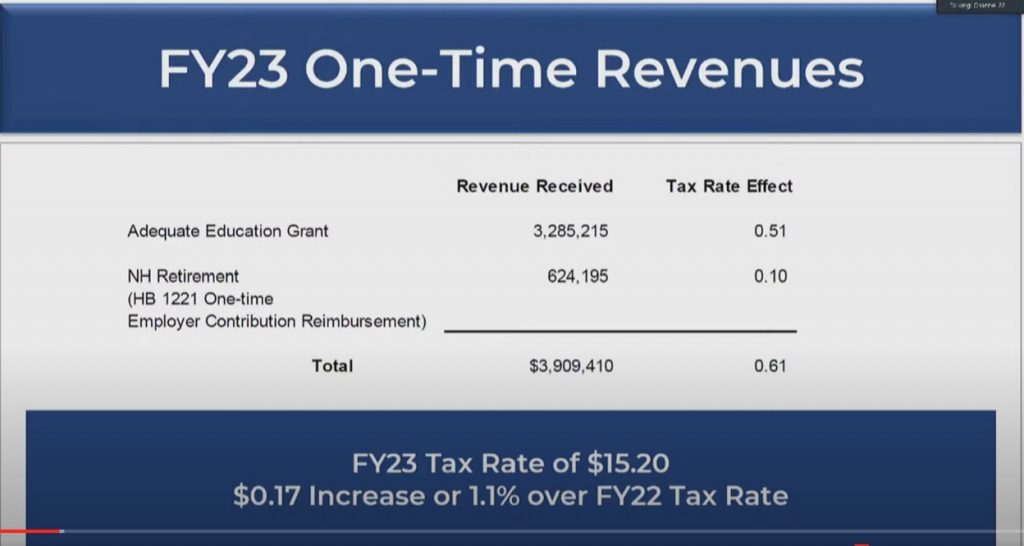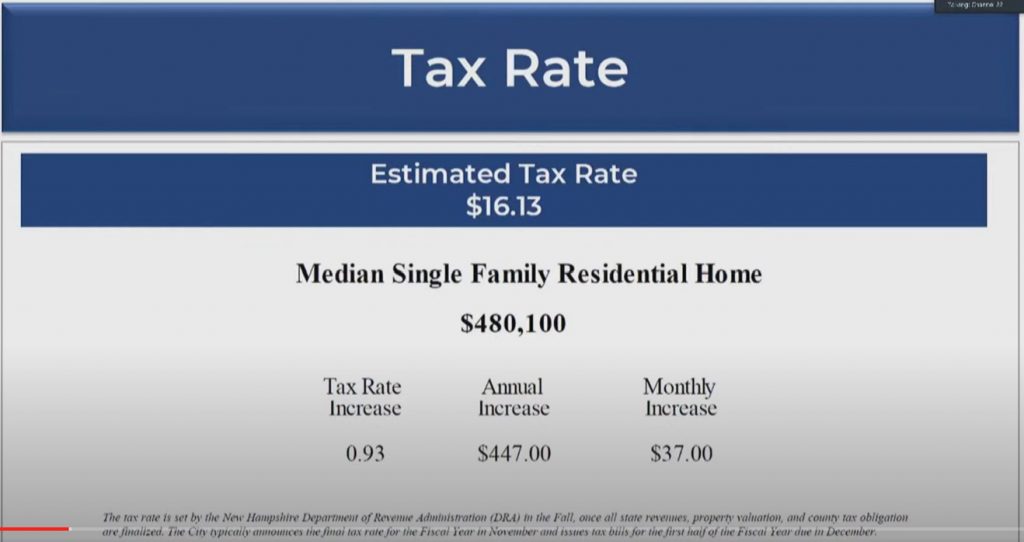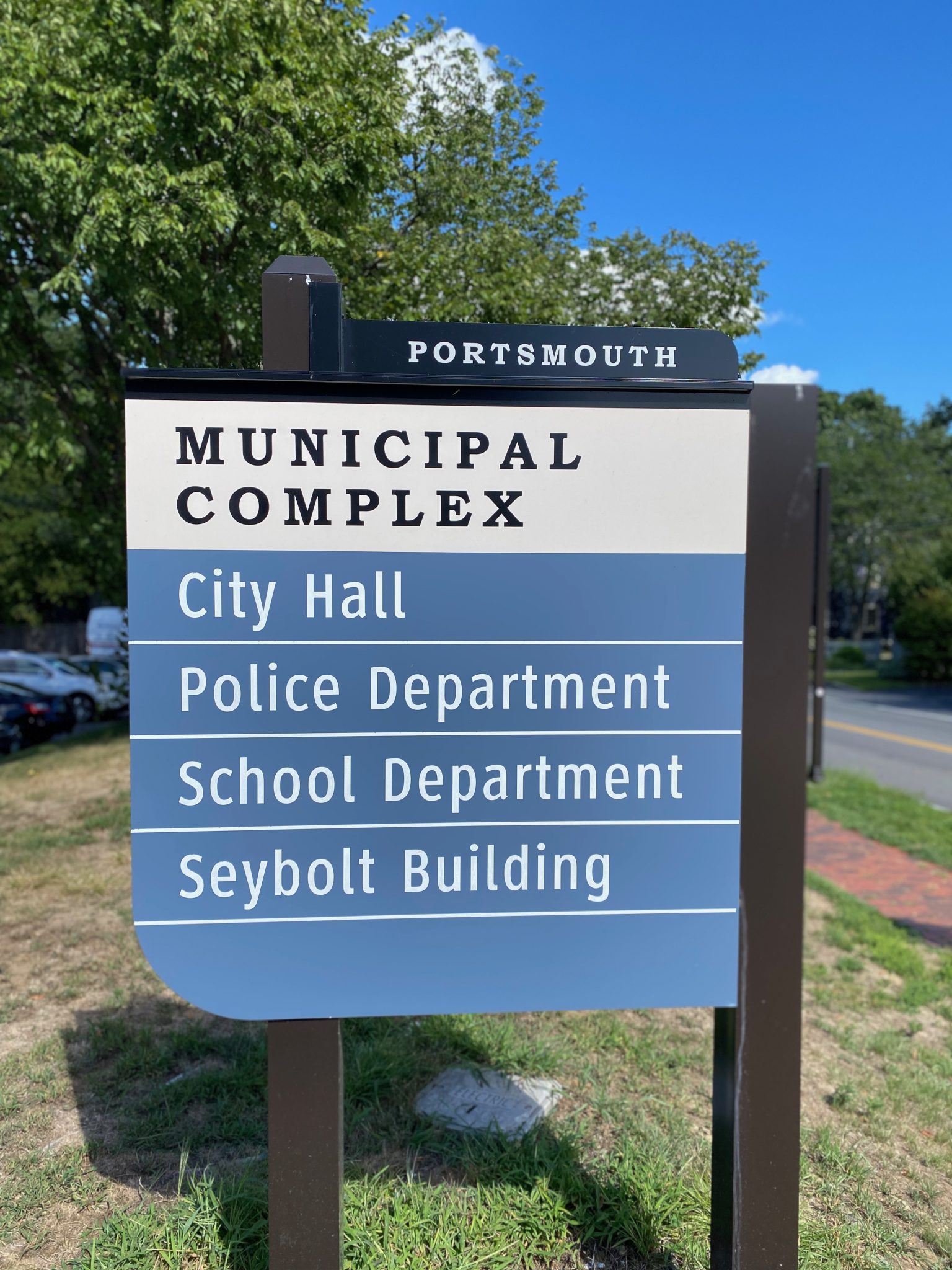By Buck Fuller
In Part I, we outlined what we have clearly heard to be the City’s spending problem. This was stated during the session on Public Comment at the May 22, 2023 City Council meeting. Councilors Moreau and Tabor noted hearing residents state this concern in the Public Dialog session they attended. And it has been repeated through last year and this year during Public Comment sessions when discussing the growing expenses related to McIntyre arose.
What follows picks up from the end of Part I and discusses real estate taxes in Portsmouth.
How This Hits Home: Residential Tax Rates
Let’s look at what all of this spending as described in Part I means for our tax rates. From the May 22nd budget hearing, we see that the FY2023 tax rate is $15.20, up $0.17 or 1.1% from FY 2022, controlled by the receipt seen below from “One-Time Revenues.”

Now let’s look at what the proposed FY2024 budget means for the tax rate next year.
The City expects it will be $16.13. That’s an increase of 6.12%.
The taxpayer might shrug the shoulders and say that’s less than how much the price of eggs rose. But real estate taxes are a much larger proportion of total homeowner expenses than are a dozen eggs.
Using inflation as an excuse for an expanding City budget avoids being disciplined and rigorous in managing our local government and how taxpayer money is spent. It is our money, by the way! In this case, the Council seems to have lost sight of that fact.

Is a Revaluation Tsunami Looming? How Long Can the City Procrastinate?
All this may pale in contrast to the effect of the imminent revaluation.
According to New Hampshire law, property values should be revalued every five years. Portsmouth previously did revaluations every year or so reportedly “to reduce the impact to economic volatility.” Due to Covid and various other reasons, the annual revaluations were dropped. That means we have to conduct a revaluation next year. It is important to revalue properties, because this is a critical and helpful component for the homeowner in gauging the impact of proposed real estate tax increases.
Because of what has happened to Portsmouth real estate values since the last revaluation, taxpayers should expect a significant increase in property values from five years ago. This suggests that current property valuations for tax purposes may only be 70% of the actual, present-day assessed value. State law requires that the value should be between 87% and 110% of the actual value of the property.
Let’s take that median value property of $480,100 seen in the above table. If this is the assessed value based on the previous valuation and it is only 70% of the current market value, then the owner could see the new value of the same property rise from 70% to 100%, or from $480,100 to $685,857. Unless the City adjusts tax rates down, the new tax increase would be $638.57. And that’s just for the median-priced residence.
This will be taxpayer reality if no budget expense cuts are made.
What Happened to the Priority of Making Portsmouth Affordable for All?
At the May 15, 2023, City Council meeting, Health Officer Kim McNamera reported on the City’s recent demographic analysis. The largest segment of Portsmouth is aged 35 to 54. This group is characterized by young families with school-aged children whose parents are likely both working. The second largest group is made up of those aged 55 and above. These people are generally retired and on fixed incomes.
Look at the increase in the tax burden for the median single family residential home. It’s up a proposed $447.00 for a residence worth $480,100. That means that half of the homes in Portsmouth are worth less than $480,100 and half are worth more. Half will pay more than $447 in additional taxes.
Many homes which have been owned for years in, say, the South End or West End, have risen to over $1 million in value due to people moving to Portsmouth from out of state. A million-dollar home’s real estate taxes will increase by $931. That’s a huge bite out of a fixed income budget for a retiree or for a family trying to stretch incomes to meet children’s needs.
The concept of affordability is critical here. As a Portsmouth resident, ask yourself, “Can I still afford to live in Portsmouth if my taxes are expected to continue to rise at these rates?” What am I getting in return for these much higher costs? Am I really getting more services or is the City Manager just getting more direct reports?”
The Threat of Rising Taxes
There is a reason people have fled Massachusetts, Connecticut, and New York. Portsmouth is a beautiful place to live and the cost of living makes it relatively affordable compared to these other states to our south. But people do have choices as to where they live and often those choices are based on economics. Higher taxes will push out those who have grown up here.
These yearly budget increases might help pay high salaries for City employees, but they sharply reduce spending power for the rest of the City residents. Rising taxes erode disposable income for all of Portsmouth’s diverse demographics. The two largest segments, ages 35 to 54 and 55 and above, are especially burdened.
Maybe the recent emigres from the states to our south can pay more, but the City Council must not assume those of us who have grown up here or have fallen in love with Portsmouth and faithfully stand by her, can afford higher taxes.
The public has asked that the Council not allow higher taxes to destroy our community. Those “wish list or nice-to-have” additions to the City budget are increasingly expensive and mean that fewer current residents can afford to live here.










